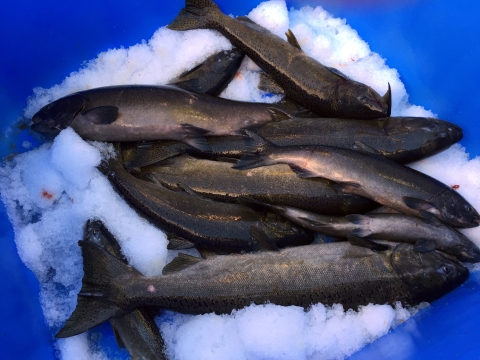Laws and Regulations
Under Secretarial Order 3206 (signed by both the Secretary of the Interior and the Secretary of Commerce), American Indian Tribal Rights, Federal-Tribal Trust Responsibilities, it is recognized that the U. S. Fish and Wildlife Service has trust responsibilities with respect to tribes. We are committed to our Tribal Trust Responsibilities to Native American Tribes as described by the Indian Trust Doctrine, developed in 1973 by the US Supreme Court and mandated in Secretarial Order #3206. The doctrine describes the trust responsibility that the Federal Government has in relation to Native Americans: in essence, a legal obligation to act in the Tribe's best interests, including duties to protect Tribal lands, fishing and hunting rights, and cultural and natural resources.
Our hatchery has a specific number of salmon needed to provide eggs and milt for a new generation of fish. Sometimes adult salmon return in greater numbers than we need. Anything above what is essential for our operations is given to the tribes or to other partners.
In 2010, Winthrop National Fish Hatchery and Methow Fish Hatchery began raising spring Chinook collaboratively through a "stepping stone" conservation model. One of the many benefits of the stepping stone model is the ability for our Winthrop hatchery to host a tribal foods program, where returning adult spring Chinook that are not needed for spawning can be donated to local tribes.
Our returning adult salmon are rarely used in hatchery spawning operations and are undesirable on the natural spawning grounds in most years. The Methow hatchery uses wild spring Chinook for its broodstock broodstock
The reproductively mature adults in a population that breed (or spawn) and produce more individuals (offspring or progeny).
Learn more about broodstock , while we use spring Chinook initially reared at their hatchery for our broodstock. The stepping stone path ends here: returning our adult salmon aren’t spawned in the hatchery, except when needed in low return years. Instead, these fish are donated to local tribes during the peak of the run, when they’re still in the best condition for human consumption. We often surplus Chinook weekly in May, June, and even July of each year.
The adult spring Chinook salmon donated to the tribes each year are part of the U. S. Fish and Wildlife Service’s duty to maintain and uphold the agency’s tribal trust obligations, as well as Grand Coulee Dam mitigation responsibilities. Through the tribal foods program, we ensure that local tribes still have access to a traditional food source for ceremonial and subsistence purposes, thereby maintaining a link to their cultural heritage. From 2010 to 2017, our hatchery has donated 220,090 pounds of salmon.

